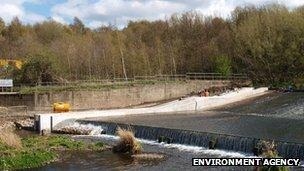The BBC reports:
Salmon, sea trout and eels are now able to swim through a new fish pass on the River Derwent in Northumberland for the first time in over 300 years.

Natural Environment Minister Richard Benyon opened the new pass at Swalwell, Gateshead.
Until now, salmon and sea trout were unable to travel very far up-river to spawn because of the restrictive weir.
Passing fish will be closely monitored by underwater cameras at the pass.
Richard Benyon MP Natural Environment Minister: "This fish pass will create exciting new opportunities for fishing in the area.”